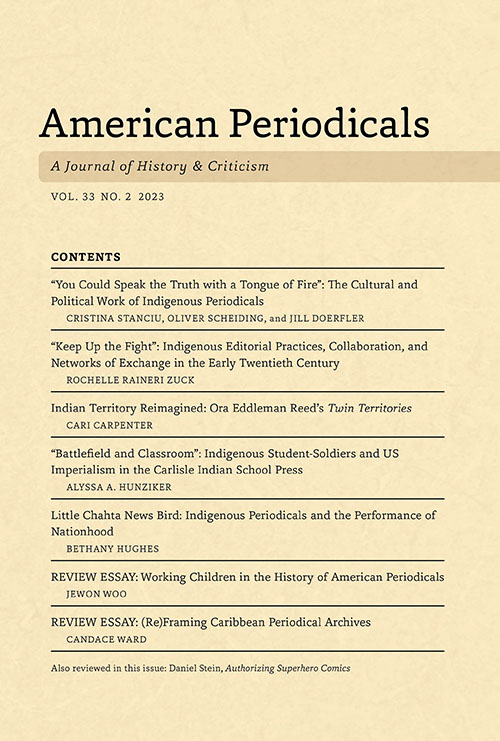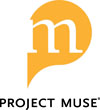American Periodicals invites scholarly essays treating any aspect of American periodicals (magazines, newspapers, and other periodical publications) from any historical period. Submissions that treat topics such as editorial policy, financing, production, readership, design, illustration, and circulation of specific periodicals are welcome, as are those that explore the position of American periodicals within the broader culture. In particular, we welcome articles that, like the periodicals themselves, cross the boundaries of several disciplines and explore the complex ways that periodicals have shaped, and have been shaped by, American culture. Essays should be limited to 7500 words, inclusive of notes.
FoRUM
The Forum feature presents a range of responses or a dialogue on a key question, innovation, or future direction in periodicals research. Forum organizers should submit a proposal to the editors at americanperiodicals@gmail.com prior to submission of manuscript. Proposals should:
- Present an overview of the question or focus of the Forum;
- Include brief (150-200 words) abstracts of proposed contributions, including names and affiliations of contributors;
- and Designate an organizer for the feature who will organize and collect contributions and be the primary point of communication between the editors and Forum participants. Note that racial and gender balance of the contributors should be considered for all Forum submissions.
Upon approval of the proposal, the Forum organizer may submit the complete manuscript of all contributions, comprising up to 10,000 words, for peer review.
In the Archives
“In the Archives” (formerly “From the Periodical Archives”) features demonstrate the pleasures of studying periodicals, raise methodological concerns regarding the use of archives in periodical research, and interrogate the idea of the archive itself. We encourage the inclusion of artifacts (illustrations, facsimile reproduction of periodicals) as well as analysis that encompasses the entirety of the periodical form: illustrations, advertisements, typography, and paratextual elements, for example. Length of submissions may vary considerably, depending on the subject matter and the methodological approach chosen by the author; 1500-5000 words, exclusive of transcriptions.
Book Reviews
Reviews for American Periodicals are generally commissioned by the Book Review Editor, who will alert potential reviewers to deadlines and provide reviewers with books for review.
A good review will describe the book being reviewed in some depth, with attention not only to argument and related content but also to method, source base, intended audience, and key contexts. But as important as such summary work is, the reviewer’s analysis and especially evaluation of the book should be the centerpiece of the review.
In all, reviewers should keep in mind that the book’s contribution to the study of American periodicals is of specific interest, and that a good review will generally situate the book in question among significant current discussions in the field. We strive for book reviews that are critical but also collegial. Honest, rigorous, and constructive evaluation of a book’s strengths and weaknesses is thus both necessary and prized.
Reviews should follow the general American Periodicals style sheet. Reviews should be headed with the book author’s name, the book’s title, the book’s press, the publication date, the number of pages, and the book’s price(s), as well as the reviewer’s name and affiliation.
With the exception of reviews for the “Brief Notice” section and review essays that consider multiple works in dialogue, reviews should generally run between 900 and 1200 words.
Reviews for the “Brief Notice” section should run between 250 and 350 words (including the publication information on the book). While these reviews should still attend to the combination of accurate summary, thoughtful analysis, and constructive evaluation called for above, “Brief Notice” reviews are designed for the reader who wants a succinct, pithy assessment of an individual title, in the spirit of periodicals like Choice and Publisher’s Weekly.
Review essays generally consider more than one book and will generally run between 2000 and 4000 words. (The Book Review Editor will give a more specific target length when commissioning such reviews.) As in the reviews above, readers should gain a clear sense of each of the books being considered and should see the play of summary, analysis, and evaluation. Review essays, though, should emphasize comparison, contrast, and synthesis, and they should group such work around an argument about the state of the books’ field(s).
American Periodicals also commissions reviews of websites, databases, other electronic resources, exhibits, and scholarship in other forms using these general guidelines. Edited collections and new editions of primary texts are eligible for review.
Please alert the Book Review Editor to any potential conflicts of interest. You should not, for example, review a book by someone at your institution or by someone to whom you’re related.
The Book Review editor edits all reviews for style, clarity, and attention to these guidelines and in communication with each reviewer. While every effort will be made to move reviews to publication, American Periodicals is under no obligation to publish commissioned reviews.
Submission Requirements
Submissions to American Periodicals should by typed, double-spaced (including quotations and notes), and should conform to the 16th edition of theChicago Manual of Style. Submissions should be limited to 7500 words, inclusive of notes. Images should be sent individually, in TIFF, JPG, or PNG format, at least 1800 x 2700 pixels (for a full-page image). For additional information regarding the journal’s house style, please see the American Periodicals Style Sheet. (See also the Council of Editors of Learned Journals guidelines for authors.)
Submissions are evaluated using an anonymous peer review process.
Submit essays in Microsoft Word format using the Scholastica portal linked below. Also, with all submissions, please include a brief biographical statement specifying academic affiliation and scholarly activities in the field of periodical studies.
Editorial Board
Editor
Sarah Salter, Emory University
Review Editors
Marina Bilbija, Wesleyan University
Brian Sweeney, The College of Saint Rose
Advisory Editors
Ayendy Bonifacio, The University of Toledo, US
Eurie Dahn, The College of Saint Rose, US
Jacqueline Emery, SUNY Old Westbury
Benjamin Fagan, Auburn University, US
Alisha Knight, Washington College, US
Brooks E. Hefner, James Madison University, US
Vanessa Meikle Schulman, George Mason University, US
Janice Simon, University of Georgia, US
Courtney Weikle-Mills, University of Pittsburgh, US
Andreá Williams, The Ohio State University, US
Jewon Woo, Lorain County Community College
To see the table of contents for the latest issues, visit American Periodicals on ProjectMUSE.
Ad closing dates
| Issue | Reservations & copy to be sent by | PDF file due by |
| Spring (March) | November 1 | December 1 |
| Fall (September) | May 1 | June 1 |
For more information or to place a reservation, please contact
Journals ManagerThe Ohio State University Press
Frequency—2 issues per year
Rates
- Full page: $300
- Half page: $200
Agency commission: 15%
Typesetting and paste up: Billed at cost
Terms: Payment due 30 days from invoice date; no cash discount; minimum order one-half page; no classified advertising; content of advertisement subject to approval by the publisher.
Mechanical requirements
Full page: 5 inches by 8 inches (30 picas by 48 picas)
Half page: 5 inches by 4 inches (30 picas by 24 picas), horizontal only
Trim size: 6-3/4 inches by 10 inches. Bleeds not accepted. Black and white only. 120 line screen. Printed offset on white, 50 pound stock. Perfect bound.
Electronic Submission: PDF with downloadable fonts included
Mailing List
Rates: $100/M Cheshire or an electronic file in ASCII format, $110/M pressure-sensitive, plus postage. 5% discount to subscription agencies.
Indexing and Abstracts
Modern Language Association International Bibliography, Ulrich’s International Periodicals Directory, Communications Abstracts: An International Information Service, Historical Abstracts and America: History and Life, Thomson Reuters Emerging Sources Citation Index (ESCI)
Code of Ethics
All OSUPress journals follow the Code of Ethics detailed here.




